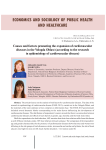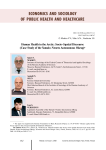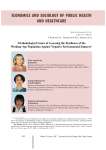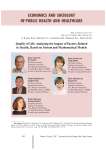Economics and sociology of public health and healthcare. Рубрика в журнале - Economic and Social Changes: Facts, Trends, Forecast

Статья научная
The article focuses on the analysis of risk factors for cardiovascular diseases. The data of the research in epidemiology of cardiovascular disease (ESSE-2013), carried out in the Vologda Oblast, and the materials of the state statistics service comprise an information base. The ESSE-2013 questionnaire included several thematic blocks corresponding to the main factors influencing the development of cardiovascular diseases. The distribution of respondents' answers reveals that there is a connection between cardiovascular diseases and effects of such factors as gender, age, heredity, and the body mass index. Of all the respondents who had infarction, 40% mention that their close relatives suffer from this disease as well. Of those who had a stroke, 30% have relatives with such a disease. The comparison of the respondents' age and gender characteristics by the presence of cardiovascular diseases shows that men and women over60 belong to the risk groups of such diseases as stroke, stenocardia and cardiac arrhythmia; the risk of heartattack is very high for men over 60; heart rhythm disorders - for women under 60...
Бесплатно

Статья научная
The purpose of the research presented in the article is to study the attitude of various social groups of residents of the Far North - the Arctic zone of the Russian Federation to health, taking into account extreme natural and climatic conditions. Geospatial conditions are imposed by the socio-spatial vector of development of the Russian Arctic, which should coordinate neo-industrial development of certain parts of this territory, the formation of a new transport and logistics system, and the reproduction of the agro-industrial complex. There are groups of actors in each of the identified areas, who carry out their activities in the Arctic territories on a permanent or temporary basis, which makes the northerners' health issues highly specific and requiring a comprehensive analysis, including the sociological one. The scientific novelty of the research and its results presented in the article consists in a combination of geo- and socio-spatial approaches to studying the attitude to health among various social groups of northerners, and analysis of their specifics in Arctic conditions. The Yamalo-Nenets Autonomous Okrug is the base region of the study. Its health care system has both positive results and unresolved issues in the field of population health. The authors reveal the possibilities of its further improvement based on sociological and interdisciplinary research from a systemic perspective, taking into account the fact that the main resources of health saving are lifestyle, nutrition, quality medical care, and the environment. The authors note that the situation significantly differs in large and small cities of the Arctic, villages and shift settlements, and among nomads in the tundra. The materials of statistics, mass representative surveys, and comparative expert assessments are analyzed. The research findings illustrate the identified opportunities for improving the health of different groups of the Arctic population and indicate the need to significantly strengthen the comprehensive scientific support of Arctic projects, including sociological monitoring. The materials and results of the work are particularly relevant due to the upcoming Russia's presidency in the international Arctic Council.
Бесплатно

Статья научная
The purpose for the research is to study the resilience of regional human population against environmental impacts based on evaluation of quality indicators of environmental living conditions and promotion of population's health on the one hand, and on population's mortality for a number of causes related to environmental degradation on the other hand. Indicators of environmental degradation may include expanding industrial production, energy consumption, population density, growing number of motor vehicles etc. The study is initiated by the trends of the second epidemiologic transition according to which diseases and causes of mortality are mostly attributable to endogenous factors related to natural ageing of a human body, its declining age-related vitality and resistance to adverse external impacts including environment. The novelty of the research lies in assessment of both population's resilience against this kind of impacts in regions with varied concentration of population and facilities used for economic purposes, and causes of morbidity and mortality from this type of impacts...
Бесплатно

Статья научная
The paper considers the formation of the structure of the indicator of the quality of health as a major factor that has the greatest impact on the quality of life. The paper also analyzes the properties of the proposed structure and main approaches to assessing and measuring the quality of life and quality of health. It is established that the integral indicator of health quality has a complex structure that belongs to the class of hierarchical structures. The paper studies properties of hierarchical structures with the help of systematic approach, according to which the integral indicator of health quality was broken down and three components (system indicators) were identified. They are as follows: quality of care, quality of environment and quality of health. Each component, in turn, was broken down and presented as a triad of interrelated objective and subjective indicators of lower level (partial indicators). The proposed system model for assessing the integral indicator of health quality is a spatial structure of this indicator, which takes into account the links between system indicators at the median level and the links between partial indicators at the lower level...
Бесплатно

